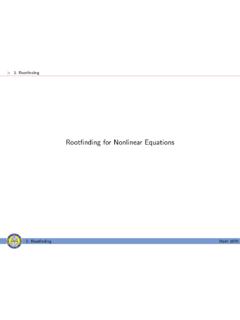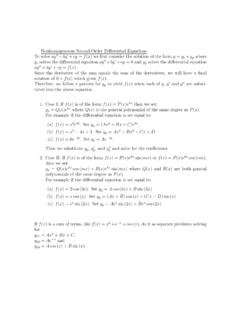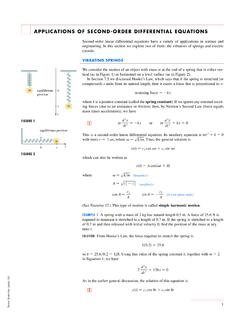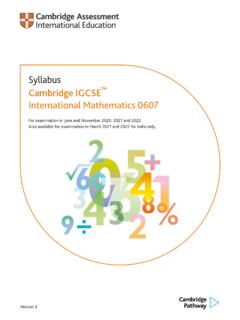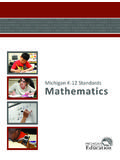Transcription of Mathematical Skills in the Workplace
1 Institute of Education, University of London Science, Technology and mathematics Council Mathematical Skills in the Workplace Mathematical Skills in the Workplace Final Report to the Science, Technology and mathematics Council Celia Hoyles, Alison Wolf, Susan Molyneux-Hodgson and Phillip Kent Institute of Education, University of London June 2002 Institute of Education, University of London Science, Technology and mathematics Council Mathematical Skills in the Workplace Table of contents Foreword by the Steering Part 1: General conclusions and executive Annex to Executive Summary: mathematics requirements for each Part 2: Summary of findings in each sector Electronic Engineering and Financial Services (Retail)..23 Food Health Part 3: The case studies Electronic Engineering and Financial Services (Retail)..50 Food Health 1 Institute of Education, University of London Science, Technology and mathematics Council Mathematical Skills in the Workplace Appendix: Instruments used in References and related Contacts.
2 92 2 Institute of Education, University of London Science, Technology and mathematics Council Mathematical Skills in the Workplace Foreword by the Steering Group This Project looked at the requirements for Mathematical Skills and understanding in the Workplace by undertaking a number of case studies in seven sectors of the economy. A key finding of this study is that Mathematical literacy is displacing basic numeracy as the minimum Mathematical competency required in a large and growing number of jobs. Mathematical literacy is the term we have used to describe the application of a range of Mathematical concepts integrated with a detailed understanding of the particular Workplace context. There is a need to distinguish between numeracy, mathematics Skills and Mathematical literacy. (see endnote). The findings from the case studies are suggesting that at all levels of the workforce:- Mathematical literacy can contribute to business success in an increasingly competitive and technological based world-wide economy.
3 There is an inter-dependency of Mathematical literacy and the use of IT in the Workplace but that this is not always appreciated. The findings have implications for adopting a more systematic approach to business success in terms of appreciating the critical part played by employee s Mathematical Skills and knowledge. In discussion with, for example, SSDA, SSCs, Government Departments, the Devolved Administrations and other stakeholders ST+MC will: a) Explore the avenues and vehicles by which the recommendations below may best be carried forward. b) Identify lines of enquiry in this field/area which would benefit from further study. Recommendation 1 Raising Visibility and Awareness of the Importance of Mathematical Literacy in the Workplace The focus should be: The nature of Mathematical literacy that it is anchored in real data, in the context of a particular Workplace . That maths used in the Workplace has economic benefits in the market-place.
4 That mathematics may be present quite implicitly in jobs and tasks, which are not obviously Mathematical . Many employees, regardless of their level of employment, are required to use Mathematical literacy. That IT and Mathematical Skills are interdependent. Foreword by Steering Group: 3 Institute of Education, University of London Science, Technology and mathematics Council Mathematical Skills in the Workplace Employers are best placed to be, and must be, actively involved in developing Mathematical literacy to meet the needs of their sector/ Workplace . Recommendation 2 Generate models for training/Professional Development to promote Mathematical literacy The focus should be: Exploring ways to help employers identify the precise role of Mathematical literacy in their work practices, including how this literacy is acquired. Exploring how Mathematical literacy can be developed in ways specific to a sector. Developing models of new forms of training for all employees which reflect Mathematical literacy that is integrated with IT competence in addition to procedural Skills .
5 Recommendation 3 Identify/further define core concepts which provide the basis of Mathematical literacy this has implications for pre-employment education and training The focus should be: To further investigate core aspects of Mathematical literacy and how these are acquired. To investigate the development of training programmes which will be effective in the Workplace by achieving a balance between physical experience and software packages, CAD/CAM. To identify pre-employment Mathematical learning experiences to support the development and enhancement of Mathematical literacy. Consider the extent to which the existing education provisions and qualifications provide the right basis for developing Mathematical literacy. Recommendation 4 Communications with employers should recognise that employers need to understand the Mathematical literacy they can expect from national qualifications The focus should be: Carry out further investigations in order to understand more precisely what is useful information for employers.
6 Determine how educators could communicate this information more effectively to employers, including ways of enabling closer links between schools, FE, HE and employers. Foreword by Steering Group: 4 Institute of Education, University of London Science, Technology and mathematics Council Mathematical Skills in the Workplace Endnote: Aspects of mathematics that the study highlights from different sectors as being of significance in Mathematical literacy include: - Integrated mathematics and IT Skills - An ability to create a formula (using a spreadsheet if necessary) - Calculating and estimating (quickly and mentally) - Proportional reasoning - Calculating and understanding percentages correctly - Multi-step problem solving - A sense of complex modelling, including understanding thresholds and constraints - Use of extrapolation - Recognising anomalous effects and erroneous answers when monitoring systems - An ability to perform paper and pencil calculations and metal calculations as well as calculating correctly with a calculator - Communicating mathematics to other users and interpreting the mathematics of other users - An ability to cope with the unexpected Foreword by Steering Group: 5 Institute of Education, University of London Science, Technology and mathematics Council Mathematical Skills in the Workplace Mathematical Skills in the Workplace This report is divided into three parts.
7 Part 1, an Executive Summary; Part 2, research findings on a sector by sector basis; Part 3, case studies of individual companies. Part 1: General Conclusions and Executive Summary General Conclusions The overall conclusions of this project are that Mathematical Skills in the Workplace are changing, with increasing numbers of people involved in mathematics -related work, and with such work involving increasingly sophisticated Mathematical activities. In agreement with other recent studies, we conclude that the country needs to rethink and look to upgrade mathematics provision for young people and to ensure that people have access to additional provision over their lifetimes. In the changing context of business practice, alongside new requirements following from the deployment of IT, the project has identified the central importance of what is termed Mathematical literacy. The concept of Mathematical literacy provides a useful device for describing current practices and needs; identifying Skills gaps in the workforce; and predicting Skills shortages in the future.
8 Mathematical literacy is described below in terms of its component Skills and its strong inter-relationship with IT, and is illustrated by reference to examples from case studies across the different sectors studied. Executive Summary 1. Introduction The report presents the findings of research undertaken between May 2001 and March 2002 into current requirements for Mathematical Skills in the Workplace . The study was commissioned from the Institute of Education (University of London) by the Science, Technology and mathematics Council. A Steering Group oversaw the project, and included representatives of ST+MC, Regional Development Agencies (RDAs), DfES, and QCA. Seven sectors were identified as the focus of the research, in consultation with representatives from the RDAs and on the basis of a preliminary briefing paper from the research team. All the sectors were identified as high priority by RDAs, and all English RDAs have at least one of their high priority sectors included in the final list.
9 The sectors selected were: Electronic Engineering and Optoelectronics Financial Services Food Processing Health Care Packaging Pharmaceuticals Executive Summary: 6 Institute of Education, University of London Science, Technology and mathematics Council Mathematical Skills in the Workplace Tourism This report is based on intensive case studies of three companies or organisations within each sector, supported by previous and related work (including previous research on Workplace mathematics carried out by members of the project team) and validation seminars with a wider range of sector representatives. 2. Objectives of the project As agreed by the Steering Group during the early phases of the project, these were: a) To identify the Mathematical qualifications and Skills demanded by employers across the chosen sectors. b) To determine the Mathematical Skills and competencies required by employers in these sectors.
10 C) To investigate the Skills and competencies that employees felt were needed for the job, and what they currently possessed d) To make recommendations about what needs to be done to address future requirements for Mathematical Skills in workplaces. e) To produce a list of those Skills and competencies needed in different sectors 3. Methodology A list of companies was drawn up following consultation with the RDAs, from which a sample was selected by the project team to represent as far as possible the spread of sectors and geographical locations. Where the RDAs had made contact with the companies and encouraged them to participate in the project, the progress of the research was smooth. When this was not the case, some problems were experienced in obtaining access to companies. In all, a total of 22 case studies were undertaken. Each case study comprised an initial 30 minute semi-structured telephone interview with a key person in the company (following a set of agreed questions).
